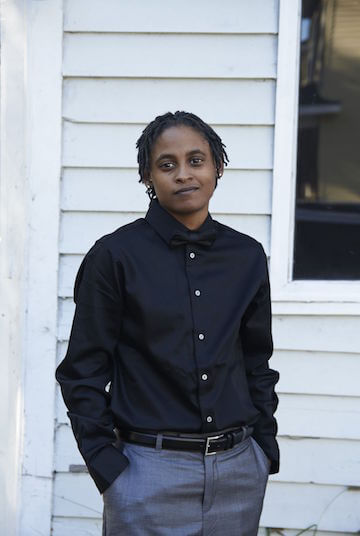Wisconsin high school student Ash Whitaker (right) with his mother, Melissa. | TRANSGENDER LAW CENTER
The Supreme Court’s term beginning on October 2 and extending through the end of June may become a blockbuster term for LGBTQ legal issues. The court has already agreed to review the Colorado Court of Appeals’ decision that the First Amendment’s free speech and religious freedom protections do not shield a baker from penalties under that state’s public accommodations law for refusing to make a wedding cake for a gay couple. In July, the high court was also asked to review a similar ruling from the Washington State Supreme Court concerning a florist who refused to provide arrangements for a same-sex wedding.
On August 25, the Kenosha School District in Wisconsin asked the Supreme Court to review a recent ruling by the Chicago-based Seventh Circuit Court of Appeals that the district must allow transgender high school senior Ash Whitaker to use the boys’ restroom facilities, and within weeks the court will also be asked to consider whether a Georgia hospital violated the federal ban on employment discrimination based on sex when it discharged a lesbian security guard. Since the court is likely to grant at least one or two of the petitions it has not yet responded to or received, 2017-2018 could be a term in which it decides an unprecedented number of LGBTQ-related cases.
The court agreeing to hear the Kenosha case would not be surprising, since just a year ago it granted review of a ruling by the Richmond-based Fourth Circuit Court of Appeals that another transgender high school student, Gavin Grimm, could pursue his claim that the Gloucester County School District in Virginia, by refusing to let him use the boys’ restroom, violated his rights under Title IX of the federal Education Amendments Act of 1972, which forbids sex discrimination by schools receiving federal money.
Key anti-gay, anti-trans discrimination, religious opt-out cases could advance
In that case, the court would have considered whether the school district should have deferred to an Obama administration regulation that schools must interpret the sex discrimination provisions of Title IX to protect transgender students. When the Trump administration later decided that the issue of bathroom access should instead be decided by state and local school authorities, the high court vacated the Fourth Circuit ruling in Grimm’s favor. The federal district court that first heard Grimm’s case is now considering whether his graduation this past June has made the case moot. Represented by the American Civil Liberties Union, Grimm argues that as an alumnus he has a continuing interest in restroom access at the high school, but the school district argues that this is too speculative to give him continued standing.
The Kenosha petition gives the Supreme Court an immediate second chance to take up the question whether gender identity discrimination is a form of sex discrimination prohibited by Title IX. The school district’s petition, filed by attorney Ronald S. Stadler of the Milwaukee firm of Mallery & Zimmerman, persuasively argues that it is important for the Supreme Court to take up this issue and resolve it for the country, pointing to accelerating demands by transgender students nationwide forcing school districts to make controversial calls.
The Kenosha district argues that it and other schools are in a Catch-22 position. If they refuse to let transgender students use facilities consistent with their gender identity, they risk being sued under Title IX. But if they allow trans students to use the facilities, they risk being sued — as some district have been — by groups of cisgender students and their parents claiming that their privacy rights are violated by exposing them to the gaze of trans students in the restrooms. None of these privacy suits has produced a final ruling against the trans-friendly school districts, but some federal district courts have ruled in favor of Title IX claims by trans students, as the Seventh Circuit Court of Appeals has done in this case.
Perhaps more importantly, the Kenosha district cogently argues that the Seventh Circuit’s ruling — the first by a federal appeals court to rule directly on the merits that Title IX covers gender identity discrimination (the Fourth Circuit ruling in Grimm’s case centering on deference to Obama administration regulations) — opens up a split among circuit courts nationwide. A central responsibility of the Supreme Court is to resolve such splits and provide a uniform interpretation of federal statutes for the entire country.
The Kenosha petition particularly notes a 2007 ruling by the Denver-based 10th Circuit involving a transgender bus driver whose access to restroom facilities along his route was the subject of an employment discrimination lawsuit under Title VII of the Civil Rights Act. Most courts dealing with Title IX claims look to interpretations of Title VII, as did the Seventh Circuit in the Kenosha case, but some district courts have held that the workplace and the school present different issues that justify different results. A federal district court in Pittsburgh, for example, rejected the application of Title VII precedents to a transgender college student’s lawsuit seeking restroom access under Title IX.
The Seventh Circuit’s decision was also based on its view that the 14th Amendment’s Equal Protection Clause requires a public school to have an exceedingly persuasive reason to discriminate because of gender identity. Such discrimination, the circuit concluded, is really a form of sex discrimination, which is subject to “heightened scrutiny” from the courts. In the Kenosha case, the Seventh Circuit upheld a trial court’s decision to issue a preliminary injunction requiring the school to let Whitaker use the boys’ restroom while the litigation proceeds. The trial court concluded that Whitaker was likely to win his lawsuit on the merits, and the Seventh Circuit concurred.
If the Supreme Court adds the Kenosha case to its docket, this will be only the second time in its history (excepting the Grimm case) that the court has agreed to rule on a transgender rights case. In 1994, the Court ruled in Farmer v. Brennan that a correctional institution had some obligation under the Eighth Amendment ban on “cruel and unusual punishments” to protect transgender inmates from sexual assaults by fellow inmates. Apart from that ruling, the court has never opined on transgender people’s right to equal protection of the laws.
The Supreme Court has been asked many times over the past quarter century to decide whether gay people can sue for sexual orientation discrimination under Title VII, but it has always denied the petitions, in each case allowing lower court decisions against gay plaintiffs to stand. Lambda Legal won an unprecedented victory, again in Chicago’s Seventh Circuit, earlier this year when a majority of the 11-judge en banc court ruled that sexual orientation discrimination claims could be pursued under Title VII. The employer in that case did not seek Supreme Court review, however.
Jameka K. Evans. | LAMBDA LEGAL
More recently, a panel of the Atlanta-based 11th Circuit Court of Appeals rejected a Title VII sexual orientation discrimination claim that Lambda Legal was litigating, and the full 11th Circuit denied a petition for review en banc. Lambda Legal represents the lesbian security guard in that case, Jameka Evans, and has announced it will file a petition with the Supreme Court shortly.
Meanwhile, late in September the New York-based Second Circuit Court of Appeals will take up the same issue in an en banc hearing of a case involving a gay skydiving instructor who claimed he was discharged because of his sexual orientation. Don Zarda subsequently died in a skydiving accident, but his estate continues to press the claim for damages under Title VII. A three-judge panel, relying on prior Second Circuit rulings, ruled he could not sue under Title VII, but the full court granted rehearing and a decision allowing Zarda’s claim to go forward is widely anticipated in light of a concurring opinion by the circuit’s chief judge, Robert Katzmann, in a similar case earlier this year Katzmann, noting the Seventh Circuit’s ruling and a similar ruling by the federal Equal Employment Opportunity Commission, which oversees enforcement of Title VII, agreed that sexual orientation claims should be accepted under its sex discrimination provisions.
The trend seems to be in that direction, as several Second Circuit trial judges have bucked precedent and refused to dismiss such claims. If the Second Circuit rules quickly, the Supreme Court may soon face yet another petition presenting this issue, with a gay or lesbian plaintiff on the winning side. Either Lambda’s petition in the Evans case or a petition in the Zarda case — or both — would then likely be granted, and the court would probably take the case up in this coming term.
The timing here is fortuitous, since this may be the last term with the five-vote majority that has been key to all major LGBTQ Supreme Court victories. The four Democratic appointments to the court — Stephen Breyer, Ruth Bader Ginsburg, Elena Kagan, and Sonia Sotomayer — appear to be most open to voting in favor of the gay, lesbian, and transgender plaintiffs. Four of the Republican appointments — Clarence Thomas, John Roberts, Samuel Alito, and Neil Gorsuch — would likely oppose the Title VII, Title IX, and equal protection claims.
That leaves the man long in the middle, Justice Anthony M. Kennedy, a Republican appointee who has emerged as the chief spokesperson for the court in major pro-LGBTQ rulings to date. He authored the opinions striking down an anti-gay Colorado constitutional amendment in 1996, striking down the Texas sodomy law in 2003, striking down the key provision of the Defense of Marriage Act in 2013, and finding a constitutional right for same-sex couples to marry in 2015. He was also likely the decisive vote in a June 2017 unsigned decision that required Arkansas officials to list lesbian co-parents on birth certificates in accordance with the 2015 marriage ruling.
Kennedy doesn’t have a perfect Supreme Court record on LGBTQ rights, having voted against litigants in several cases, most pertinently on the question whether the Boy Scouts of America had a First Amendment defense to a discrimination claim by a gay assistant scoutmaster. There, he joined the 5-4 majority rejecting James Dale’s discrimination claim and reversing a ruling by the New Jersey Supreme Court. Still, Kennedy’s status as the swing voter provides hope that LGBTQ litigants can win some or possibly all of the cases that could come up this term.
According to published reports, Kennedy, who was nominated by Ronald Reagan in 1987, has told law students who have applied to be clerks for the court’s 2018-19 term that he is thinking of retiring. Any replacement nominated by Donald Trump — or Mike Pence — is unlikely to provide a vote for LGBTQ litigants.
Our current odds at the Supreme Court also rely on two other senior justices, Ginsburg and Breyer, both appointed by Bill Clinton a quarter century ago, staying on the court. The nation may, at this perilous moment, be on the verge of a major realignment in the high court’s membership and jurisprudential orientation. Getting these critical issues about anti-LGBTQ discrimination before the justices now seems exceedingly preferable to having them come up in court terms down the road.






































